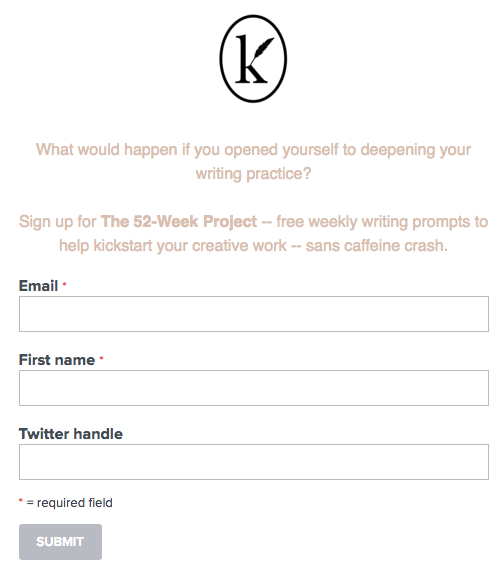Ask, and ye shall receive (at least, that's the plan)
The first hurdle to jump in content marketing is knowing your audience, even before you have a product to sell, and it doesn't have to be a mystery: Outright asking them what you want to know is the simple solution, and you can do so with a signup form. If you use a site like Squarespace, which I do, you can have forms baked in or choose to use buttons that lead to forms collecting details about your audience.
Say you're already there and you've set up your signup form to collect your subscribers' data for more personalized email marketing about your product. So what do you do when your contacts only give you their email address and leave the rest of your form's fields blank? Pull your hair out over how they didn't intuit that you asked their t-shirt size for a reason, gosh-darnit?
Are you asking too much?
First, make sure your form doesn't overwhelm people by asking for too much information from them. Their birthday? Are you really going to send them a birthday email? Maybe so, and kudos, but if not, eliminate that field. Anything beyond first name and email address will see a drop in your signups, so only ask for information you'll use.
For The 52-Week Project, I ask for three pieces of information: email address, first name and Twitter handle:
So far, this has been the only info I've needed to help this community. If that changes in the future, I think of signup forms -- and basically all marketing tactics -- as malleable, based on needs. I've had a lot of success with this simplistic form: It's my highest-performing form to date.
Be thoughtful about this so you set up a form that serves you, by collecting the data you need, and your subscriber, by respecting their time.
Don't give them a way out (in a nice, non-threatening way)
Make the most important fields -- or maybe even all of them -- required so a contact can't bypass them. Think about when your parents asked you to finish your dinner and, if you felt like it, clean up the kitchen. Don't pretend you were a wunderkind, friend; you know you didn't clean that kitchen unless their suggestion became a mandate. Giving your audience these gentle mandates keeps them on course. Keeping your kitchen sparkling, well, that's a mandate to pass on to your own children.
For The 52-Week Project's form again, you'll see how the only required fields are email address and first name. You need to require the email, because, duh, and including first name personalization in your emails is a major win.
But not all folks use Twitter or want to interact with me in that way, and that's A-OK. Newsletters are to serve my audience, not grow my Twitter following.
Has it gotten out of hand?
Eek, you missed your chance, and now you have loads of email addresses and no details. Create a reengagement email to ask your clients for exactly what you need from them and take the extra step to share why they should tell you. Earnest Home Co. did a great job of this:
I'm a big fan of this route as a longtime email marketer but also a champion for honesty: Why not tell the folks who are reading your emails how you're going to use their information? What service are you doing to your clients by concealing your marketing plans?
Note Erin's word choices: "easy solution," "quick way," "exactly what YOU NEED" and "cater emails to your liking." She tells me 1, that I can quickly create a tailored experience with her brand without clogging up my inbox, and 2, that this reengagement email is all about my needs. She goes on to say that sharing my email preferences helps her business, so I'm helping her by helping myself. Win-win.
And her call to action, the "Click HERE" button, draws the eye to where she needs it.
How do you reengage your clients? Are you collecting the data you need and using it to your best advantage?
A version of this piece originally appeared in Emma, Inc.'s online community forum, Emma Community.
You might also be interested in:
Want to receive news and blog posts straight to your inbox?
Subscribe here!
As a special gift, you'll receive my free study on the 10 biggest mistakes writers make (and how to fix them).




